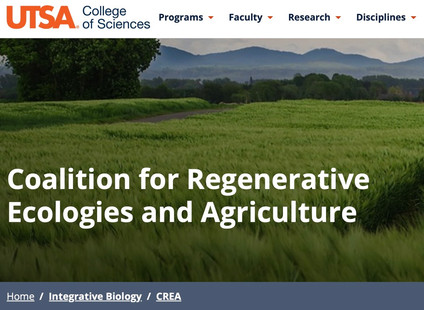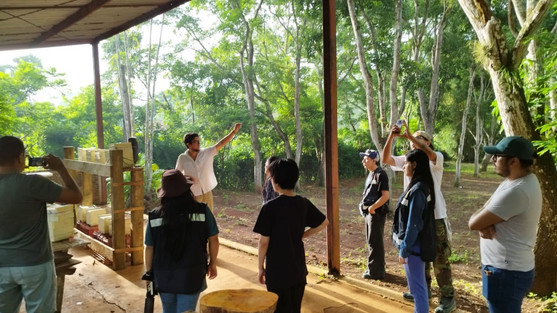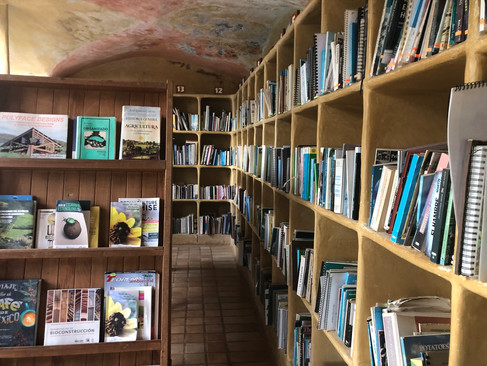Coalition for Regenerative Ecologies and Agriculture (CREA)
- Terra Advocati

- Jan 2, 2024
- 4 min read
Updated: Oct 21, 2024
In the latter part of 2023, we were thrilled to learn that a grant from the United States Department of Agriculture’s (USDA) Hispanic Serving Institutions (HSI) Education program was awarded to our partners Amelia King-Kostelac, Kenneth Walker, and Jennifer Smith at The University of Texas San Antonio (UTSA), and Marissa Ramirez from SPC Mexican American Studies.
Terra Advocati’s Jess Mayes, in collaboration with Estampa Verde's Antonio Carillo Bolea, played an instrumental role in shaping the vision, scope, scale, and international collaborative aspects of what has now developed into The Coalition for Regenerative Ecologies and Agriculture (CREA) program.
This innovative approach seeks to create a collaborative exchange between the US and Mexico focused on Nature-based Solutions, Regenerative Agriculture, Holistic Management, Agro-ecological Design, Vetiver Systems, Silvopasture, watershed management, and various other aspects of regenerative systems, all intricately interwoven within historical, cultural, and community contexts. Scroll down to see photos and read more about the program, or visit the UTSA website.
Terra Advocati’s role in this program will be to work with partners on both sides of the border to provide logistics, educational material, direction, and ensure mutually beneficial outcomes for all program participants as the program evolves.
I wish to express my heartfelt appreciation to all our partners for their invaluable contributions through collaborative endeavors. We eagerly anticipate cultivating enriching and profound experiences for students, faculty members, and the community in the forthcoming years through this program.
For further details, the comprehensive program description, as featured on the UTSA website, is included below for reference. Please click here to access the complete description, explore program specifics, or commence the application process.
Author: Amelia King-Kostelac, Ph.D.
The Coalition for Regenerative Ecologies and Agriculture (CREA) Study Abroad Program is part of a new joint effort between St. Philip's College (SPC) and The University of Texas at San Antonio (UTSA) to establish a transnational collective that will support regenerative ecological and agricultural practices with farms and organizations based in both San Antonio, Texas and Veracruz, Mexico.
CREA supports three different programs which provide students with hands-on learning and research experience:
CREA Fellows Program (Spring)
CREA Study Abroad Program in Veracruz, Mexico (Summer)
CREA Farm Internships (Fall)
CREA is generously funded by a United States Department of Agriculture (USDA) Collaborative Hispanic Serving Institutions (HSI) Education Grant.
CREA Fellows Program Overview
The Fellows Program will provide 20 students (10 each from SPC and UTSA) with the opportunity to combine regenerative agriculture with field engagements and eco-cultural literacies across the US and Mexico. Each month, fellows will participate in a Fellows Platica or Field Session at local collaborating farms to develop understanding of ethical and practical context for regenerative ecologies.
Benefits to Becoming a Fellow
Gain experience with regenerative agriculture, ecology and environmental justice
Identify and develop your own research project focused on regenerative cultural, ecological or agricultural practices
Build professional and academic connections with community leaders and organizations devoted to supporting regenerative agriculture and environmental justice in San Antonio and Mexico
Fellows will receive a stipend of $1500
Study Abroad Program Overview
Veracruz is Mexico's oldest, largest, and most significant port city. It is the site where Hernán Cortés first made contact with the Americas in 1519; where enslaved peoples from Africa first arrived in Mexico; and where a coalition of enslaved African and Indigenous peoples rebelled and established one of the first free communities in the Americas.
Today, it is a region characterized by a blend of cultures from Indigenous, Spanish, and Afro-Caribbean sources, which is particularly found in culinary, cultural, and artistic expressions. As an agricultural powerhouse, Veracruz State is the number one national producer of beef, eggs, and citrus. This production has severely impacted the native peoples and ecosystems, especially through deforestation for farming. As one of the most biodiverse states in Mexico, regenerative agriculture and ecology has gained significant traction in the past 20 years, and now Veracruz has some of the most emblematic regenerative projects in the Americas.
Through a six-week program (two weeks in San Antonio, followed by four weeks in Veracruz, Mexico), students will gain technical knowledge and skills in:
Regenerative agriculture (vetiver systems, agroforestry, permaculture, beekeeping, keyline design, composting)
Benefits of regenerative agriculture related to wildlife biodiversity (with emphasis on birds, water and soil quality and ecosystem health)
Community engaged methodologies (ecocultural, Indigenous, and intersectional qualitative research praxis)
Field and digital field methods (drones, photovoltaics, cameras/photogrammetry, soundscapes, field wildlife biology)
Students will also have the opportunity to participate in field trips to archaeological museums, Temazcal sweat lodges, laguna kayaking/boating/fishing, swimming in beaches and springs, traditional fandango gatherings, and more.
CREA Farm Internships
Students who have completed the Coalition for Regenerative Ecologies and Agriculture (CREA) Fellows program or participated in the Coalition for Regenerative Ecologies and Agriculture (CREA) Study Abroad program are also eligible to complete paid 6-8 week internships ($15/hr, up to 20 hrs a week) with local farms and environmental sustainability organizations. These internships will provide students with hands-on experience in areas such as:
Conservation research and community outreach and community engaged education
Native landscapes and water conservation projects
Plant propagation and greenhouse management
Pollinator habitat restoration in urban settings
Organizational sustainability management in a college/community setting
Conservation research and community outreach
Hands on opportunities to produce food in an urban context
On farm pest and weed management with a focus on Integrated Pest Management
Regenerative farming solutions for building healthy, nutrient rich soils
Community engagement to promote healthier communities via our Markets and workshops
Expanding the farm’s reach and impact within the Alamo Colleges District students, staff, and faculty
Participating organizations may vary from year to year, but include sponsors such as Garcia Street Urban Farm, Eco Centro, Gardopia, the San Antonio Food Bank, and Estampa Verde (summer 2025).

















































Comments